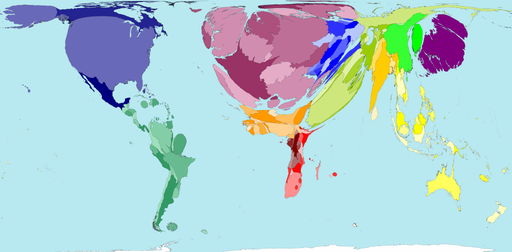The challenges facing the Greek economy and the ensuing intervention from the International Monetary Fund (IMF) to help withstand further damages from the fall-out look familiar to many African bloggers. During previous crisis, the IMF was involved in proposing structural adjustments to struggling African economies, with various outcomes.
Reactions from African bloggers range from cautionary tales from past experiences to lessons that ought to be learned for their own regions.
Le petit nègre notices that Europe was reluctant to ask the IMF to step in during the Greek crisis. He is wondering why asking the IMF for help was such a hard decision for a European country when it seemed to be rather common event not so long ago in Africa. Here is why he thinks European countries are worried about an IMF prescription for Greece (fr):
Le twist dans le cas grec et que, comme on ne peux pas dévaluer l’Euro comme on a jadis dévalué le Franc CFA, les dirigeants européens se retrouvent contraints et forcés d’aider d’une manière ou d’une autre la Grèce
Similarly, Lambert Mbela also argues that given the level of the budget deficits in many European countries beside Greece, substantial devaluation should be considered for the Euro (fr):
Admettons quand même que les situations sont similaires : déficit budgétaire, endettement public, taux de chômage élevé, balance commerciale déficitaire, mauvaise gestion des finances publiques, avec comme cerise sur le gâteau, fricotage des données publiques !!!
Sérieux, si c’avait été le Mexique, l’Argentine ou le Burkina-Faso qui présentait de tels manquements, Monseigneur FMI préconiserait déjà une dévaluation « compétitive » et des programmes d’ajustement structurel afin de rétablir les finances publiques.
Seriously, if this was Mexico, Argentina or Burkina-Faso, the mighty IMF would have already prescribed competitive devaluation and structural adjustment to help the public finances.
Éric Toussaint explains that the seemingly odd provision of IMF interventions according to regions might be a direct consequence of the fact that southern countries do not have much of a say in the decision process at the IMF (fr):
l’Afrique subsaharienne occupe une place égale à la France alors qu’elle compte 10 fois plus d’habitants. L’Afrique au Sud du Sahara ne dispose que de deux membres au sein du Conseil d’administration du FMI et ces deux membres doivent exprimer le point de vue de 48 pays [..] Vous imaginez la difficulté des 48 pays africains à se faire entendre si seuls 2 administrateurs les représentent.
Musengeshi Katata at Forum Realisance investigates further into the reasons why the Greek crisis has gone unnoticed for so long (fr). Although the IMF recently published an optimistic report on the state of the ssAfrican region (fr), many are still skeptical because the emphasis was put on economic growth, leaving many issues still unspoken (fr).
Finally, Paul Bara at AfriqueRedaction is pessimistic about a sustainable solution to the global crisis(fr):
Notre modèle de croissance basé, sur la séquence : crédit – consommation – dette, est obsolète. En second lieu parce que les systèmes politiques et les gouvernements semblent incapables de jeter les bases d’un nouveau modèle de développement [..] Un Krach parait donc inévitable en 2010 puisque comme l’explique Kenneth Rogoff, la défaillance d’un état (ou de plusieurs) paraît inévitable : se posera alors de manière aiguë le problème d’un modèle de croissance totalement inadapté (crise systémique).








3 comments